Nevertheless, the Chief Judge's Office has announced that Cook County Courts will be closed tomorrow (with a few exceptions). Anyone needing to see the actual Order entered in this regard can click here. For everyone else, herewith the court's press release:
Due to predictions of significant snowfall, high winds causing blizzard-like conditions, and extremely low temperatures and wind chills in Cook County, Chief Judge Timothy C. Evans ordered courts and related operations of the Circuit Court of Cook County to be closed Friday, December 23.
This means that, with the exception of adult bail hearings at the Leighton Criminal Courthouse and juvenile detention hearings at the Juvenile Courthouse, and hearings on petitions for civil emergency protective orders, there will be no court proceedings (in-person or virtually) in any Cook County courthouse, and the Office of the Clerk of the Circuit Court will also be closed, except for purposes of staffing bond court and detention hearings.
All cases previously scheduled for Friday, December 23, 2022, will be rescheduled by order of the Presiding Judge of each division and district of the court, and the clerks will send notices of the new court dates.
Hearings on existing civil protective orders (domestic violence orders of protection, stalking no contact orders, civil no contact orders, firearms restraining orders) will be rescheduled to a date no later than January 6, 2023. Civil protective orders set to expire on December 23 are extended to January 6, 2023.
Bond court bail hearings, including those for domestic violence offenses and suburban cases, and juvenile court detention hearings will take place according to the court’s weekend and holiday schedules.
Hearings for new civil emergency protective orders (EOP) will be held from 9:00 p.m. - 3:00 a.m. on Friday, December 23, and from 1:00 p.m. to 6:00 p.m on Saturday, December 24. A civil EOP hearing can be requested by visiting Illinois Legal Aid Online at https://www.illinoislegalaid.org/legal-information/emergency-order-protection-cook-county.
For domestic violence advocacy, assistance with emergency EOP hearings, or information about a criminal order of protection, the public can call:
Connections for Abused Women and their Children’s 24-hour hotline: (773) 278-4566
Illinois Domestic Violence Hotline in Chicago: (877)-TO END DV (voice) or 1-877-863-6338 (Voice) or 1-877-863-6339 (TTY). The hotline is toll free and confidential.







































